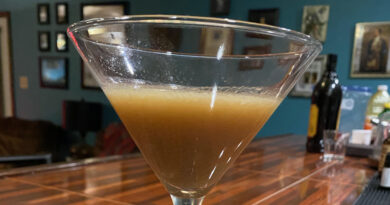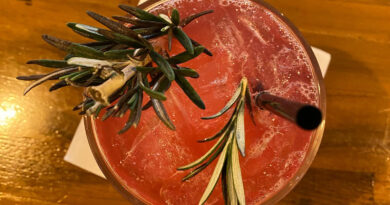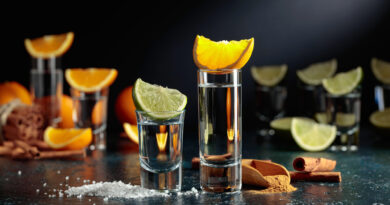Sipping on Irish whiskey and Scotch whisky
Story and photos by JANNA ZEPP
What’s the difference between an Irish person and a Scottish person? Twelve miles of salty water. The same cannot be said of the whiskey and the whisky, though water itself might well be the difference.
First, the spellings of the spirits: Irish is “whiskey” (as is the American variety). Scotch rejects the E, thus, “whisky.” I don’t know why. I’ve yet to find a reason.
Second, the taste and the way they are made differ. Scotch whisky comes from malted barley, which produces a fuller, weightier taste than most non-Scottish whiskies. Irish whiskey uses both malted and unmalted barley, which makes for a smoother, more refined taste.
Third, Scotch is double distilled. Irish whiskey is triple distilled. That fact alone also accounts for the difference in taste.
I encourage you to look up and learn more about whiskey/whisky. It makes for fascinating reading. But let’s get on with the cocktails.
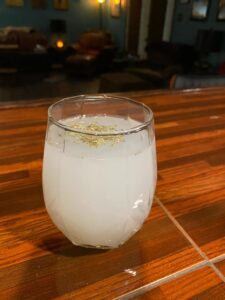 Green With Envy
Green With Envy
Ingredients
1 basil leaf
Ice cubes
1 1/2 parts Irish whiskey
1 part lemon
1 1/2 parts Prosecco
1 part simple syrup
Directions: To make the simple syrup, add 250 milliliters boiling water to 250 grams white granulated sugar and stir well to dissolve. Allow to cool, bottle and refrigerate.
Lightly muddle basil leaves in your cocktail shaker.
Add all the rest of the ingredients, except sparkling wine, and shake with ice.
Double strain into a chilled tall glass filled with ice. Top with sparkling white wine and garnish with a basil leaf. Enjoy!
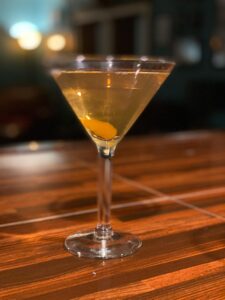 Blood & Sand
Blood & Sand
Ingredients
3/4 ounce Scotch whisky (choose one that isn’t too peated)
3/4 ounce sweet vermouth
3/4 ounce Heering cherry liqueur
3/4 ounce orange juice, freshly squeezed
Garnish: orange peel
Directions: Add the scotch, sweet vermouth, cherry liqueur and orange juice into a shaker with ice and shake until well-chilled.
Strain into a chilled coupe or cocktail glass.
Garnish with an orange peel.
When you raise your glass to toast your friends, you will want to say “Sláinte” if drinking Irish whiskey or “Sláinte mhath” if quaffing Scotch. Both are Gaelic (and yes, there is a difference between Irish Gaelic and Scottish Gaelic).
In Irish, say “Slawn-juh” and in Scottish, say “Slawn-juh-VAH.” Both mean “to your very good health.” No, the spelling and pronunciation do not match.
I often say that, in Gaelic, a word might be spelled “gribnarf” but it is pronounced “ralph” because it’s ancient language and the alphabet becomes a soccer ball as a result.
Another traditional Irish toast involves something rude done to English invaders which cannot be repeated in front of small children or ladies of quality. But the other Scottish toast goes like this:
“BUY YER ANE DRRRRRINK!”
The sentiment encourages, in fine Scottish tradition, whether Highlands or Borders, to pay on separate checks.
Let me know what you think about the cocktails at Janna.Zepp@gmail.com.
Sláinte mhath!


